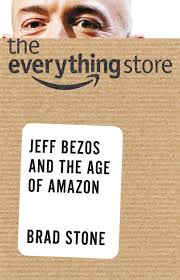Brand Book Bites From The Everything Store
– the book: The Everything Store: Jeff Bezos and the Age of Amazon, an expose of sorts of the world’s largest online retailer.
– the brain: Brad Stone, senior writer for Bloomberg Businessweek, who usually covers companies such as Apple, Google, Facebook, and more.
– the best bits: The Everything Store includes so many revealing insights, fun anecdotes, and interesting facts about Amazon and its founder and CEO Jeff Bezos. A few of my favorites:
- The culture at Amazon seems Apple-esque — driven by a combination of fear of and admiration for Bezos. Brad describes it as “….notoriously confrontational, and it begins with Bezos, who believes that truth shakes out when ideas and perspectives are banged against each other.” This explains why Bezos will take up a complaining customers’ cause and interrogate the manager responsible for the problem. I find this both comforting as a customer and disturbing as a student of corporate culture.
- Bezos has clearly articulated the leadership principles by which he and his managers lead the organization. Among them are:
Customer Obsession — Leaders start with the customer and work backwards. They work vigorously to earn and keep customer trust. Although leaders pay attention to competitors, they obsess over customers.
Ownership — Leaders are owners. They think long term and don’t sacrifice long-term value for short-term results. They act on behalf of the entire company, beyond just their own team. They never say “that’s not my job.”
Frugality — We try not to spend money on things that don’t matter to customers. Frugality breeds resourcefulness, self-sufficiency, and invention. There are no extra points for head count, budget size, or fixed expense.
- Amazon’s leadership in certain categories results from a deliberate strategy to intimidate, dominate, and even crush if necessary, the competition. Just ask the guys who ran Diapers.com. After calculating that “Amazon was on track to lose $100 million over three months in the diaper category alone” in its attempt to offer the lowest prices in the category, they acquiesced to Amazon’s attempts to acquire their site, The deal, Brad writes, was “struck with Amazon, largely out of fear.” Again, what’s good for customers seems at odds with what’s good for the people inside Amazon.
– the brand story: Of course, the brand story of the book is Amazon — but it’s also Jeff Bezos. In researching the book, Brad learned that Bezos attended a school for gifted children where he developed a survey to evaluate the teachers based on “how they teach, not as a popularity contest.” Brad also discovered Bezos’s biological father who didn’t know his son was the leader of one of the most powerful companies in the world due to an agreement he had with his former wife to stay out of her and her son’s life. Brad describes Bezos as an “avid problem solver…who has a chess grand master’s view of the competitive landscape…and vast ambitions.” All of this helps create an understanding of Jeff Bezos the brand and makes sense of the way he runs his company.
– the bottom line: The Everything Store is a fascinating read about a man and a company who influences the way millions of people shop and live today.
Listen to my conversation with author Brad Stone to learn:
- about the “Amazon.Love memo,” an internal memo in which Bezos laid out his a vision for he wanted his company to conduct itself and be perceived by the world
- how the name Amazon was selected for the company
- how Amazon shares the problem of scale with many other companies that grow quickly — how do they expand while ensuring they have a brand they can be proud of
Podcast: Play in new window | Download
other brand book bites:
- Power Branding by Steve McKee
- REMOTE by Jason Fried, CEO of 37Signals
- ENGAGED! Outbehave Your Competition to Create Customers for Life by Gregg Lederman
